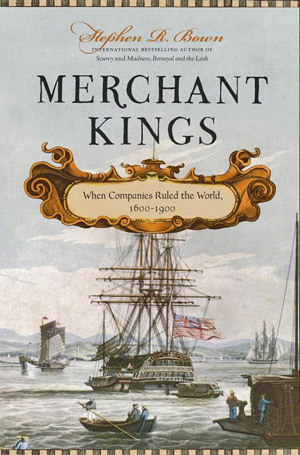Merchant Kings:
When Companies Ruled the World, 1600-1900

Support Canada's History in other ways (more)
by Stephen R. Bown
Douglas & McIntyre, Vancouver, 2009
324 pp., illus., $34.95 hardcover
The appeal made by historian Ramsay Cook last year to “broaden” Canadian history and consider it in the context of world events is evidenced in works such as Stephen R. Bown’s Merchant Kings, which provides a very readable comparative look at six of the most prominent characters in the trading companies that dominated world trade, commerce, and colonial expansion in the seventeenth and eighteenth centuries.
Some of these men — Cecil Rhodes (British South Africa Company), Robert Clive (English East India Company), and the Hudson’s Bay Company’s George Simpson — have had their exploits documented in extensive biographies. The others — Jan Pieterszoon Coen (Dutch East India Trading Company), Pieter Stuyvesant (Dutch West India Company), and Aleksandr Baranov (Russian American Company) — have had less written about them.
Bown employs several tactics to encourage readers to think about the differences and similarities among his protagonists, such as providing a timeline of events as well as references throughout the text to help situate particular characters in relation to each other and to world events.
Bown plays no favourites as he shapes the pattern for the type of man one had to be to become a merchant king. Some are racist, some are militaristic; none are particularly attractive.
Each man is presented as arrogant, controlling, self-righteous, and driven more by power than by money; but without exception they are devoted to the best interest of their companies — profit. Considering that the missions granted to these men, and accomplished by them, were just as extraordinary as their personalities, certain of these character traits appear to have served a purpose.
Whether they were truly merchant kings, or merely renegades in the wilderness, this book provides a very accessible glimpse into a fascinating era when companies more than countries ran the world and the actions of individual men really did change it profoundly.
— Deborah Morrison (Read bio)
Deborah Morrison is the executive director of SEVEC and the former president and CEO of Canada’s History Society.